
CONOCIMIENTO DE LOS PADRES ACERCA DE CÓMO - CEFAC
CONOCIMIENTO DE LOS PADRES ACERCA DE CÓMO AFECTAN LOS HÁBITOS PARAFUNCIONALES EN LAS FUNCIONES ESTOMATOGNÁTICAS Parents’ perception about the influence of bad habits in the stomathognatic functions Yessica Marlene Arana Reyes Quevedo, Erika Liliana Orozco Matzunaga, María Julia Soraluz Manrique Centro Peruano de Audición Lenguaje y Aprendizaje (CPAL) Lima – Peru Articulo original Introducción: la prevención es la mejor manera de enfrentar enfermedades, esto también se puede aplicar a las parafunciones que alterarían el normal funcionamiento del sistema estomatognático. Siendo el crecimiento una característica de la etapa infantil, cualquier influencia sobre este sistema la hace más vulnerable en esta etapa de constantes cambios. El equilibrio fisiológico de este sistema debe ser supervisado durante toda la vida desde muy tempranamente. Objetivo: el presente trabajo pretende averiguar el conocimiento que tienen los padres acerca de los hábitos parafuncionales y como estos pueden afectar a las funciones estomatognáticas en sus niños. Metodos: se realizó una investigación descriptiva acerca del conocimiento de los padres de cómo afectan los hábitos parafuncionales en las funciones estomatognáticas. El universo estuvo constituido por 120 personas, madres y padres de condición social media que tuvieran niños (as) entre 3 a 5 años de edad a quienes se le realizó una encuesta de forma individual, la misma que se llevó a cabo en tres diferentes instituciones educativas particulares ubicadas en los distritos de Pueblo Libre, Miraflores y San Borja. Resultados: lo más destacable del estudio es que el 83 % de los padres considera que la calidad de vida de sus niños sí se vería afectada por algunos hábitos orales pero refiriéndose a consecuencias socio-emocionales y no a alteraciones en las funciones estomatognáticas. Así también, para ellos no hay posibilidad que se pueda alterar con algún comportamiento la forma de la cavidad oral. El 72% no sabe cuáles son los hábitos que pueden alterar la cavidad oral de su hijo, mientras que el 28% restante menciona a la succión digital como responsable. Finalmente un gran porcentaje, manifiestan que sus hijos no presentan problema alguno para respirar, masticar o deglutir los alimentos y un 28% reportó que sus niños si presentan problemas para hablar. Conclusiones: al final de la investigación se pudo concluir que la gran mayoría de padres de familia no tienen conocimiento de cómo afectan los habitos parafuncionales en las funciones estomatognáticas ya que cuentan con poca información de parte de profesionales que tienen estrecha relación con sus niños. Además los problemas que son detectados por los padres son los vinculados al habla debido a que éstos son fácilmente observables. Descriptores: hábitos orales; funciones estomatognáticas; niños KNOWLEDGE OF PARENTS ABOUT HOW PARAFUNCTIONAL HABITS AFFECT STOMATOGNATIC FUNCTIONS Conocimiento de los padres acerca de cómo afectan los hábitos parafuncionales en las funciones estomatognáticas Yessica Marlene Arana Reyes Quevedo, Erika Liliana Orozco Matzunaga, Maria Julia Solaluz Manrique Centro Peruano de Audición Lenguaje y Aprendizaje (CPAL) Lima – Peru Original Article Introduction: prevention is the best way to deal with diseases; this can also be applied to parafunctions that would alter the normal functioning of the stomatognathic system. Growth being a characteristic of the infantile stage, any influence on this system makes it more vulnerable at this stage of constant change. The physiological balance of this system will be monitored for life from very early. Objective: this paper aims to ascertain the knowledge that parents have about parafunctional habits and how they can affect Stomatognathic functions in their children. Methods: a descriptive research about parental knowledge of how parafunctional habits affect Stomatognathic functions. The sample consisted of 120 persons, parents of middle social status having children between 3 to 5 years of age who individually underwent a survey, the same that was carried out in three different particular educational institutions located in Pueblo Libre, Miraflores and San Borja Districts. Results: the most remarkable of the study is that 83% of parents believe that the quality of life for their children would be affected by certain oral habits but referring to the socioemotional consequences and not to alterations in the Stomatognathic functions. Also, for them there is no possibility that the shape of the oral cavity can be altered with any behavior. 72% do not know which the habits that can alter your child’s oral cavity are, while the remaining 28% refer to the finger sucking as responsible for that. Finally, a large percentage, say their children have no problem breathing, chewing or swallowing food and 28% reported that their children have trouble in speaking. Conclusions: at the end of the investigation it was concluded that the vast majority of parents are unaware of how parafunctional habits affect stomatograthic functions. Keywords: oral habits; stomatognathic functions; children
© Copyright 2026

